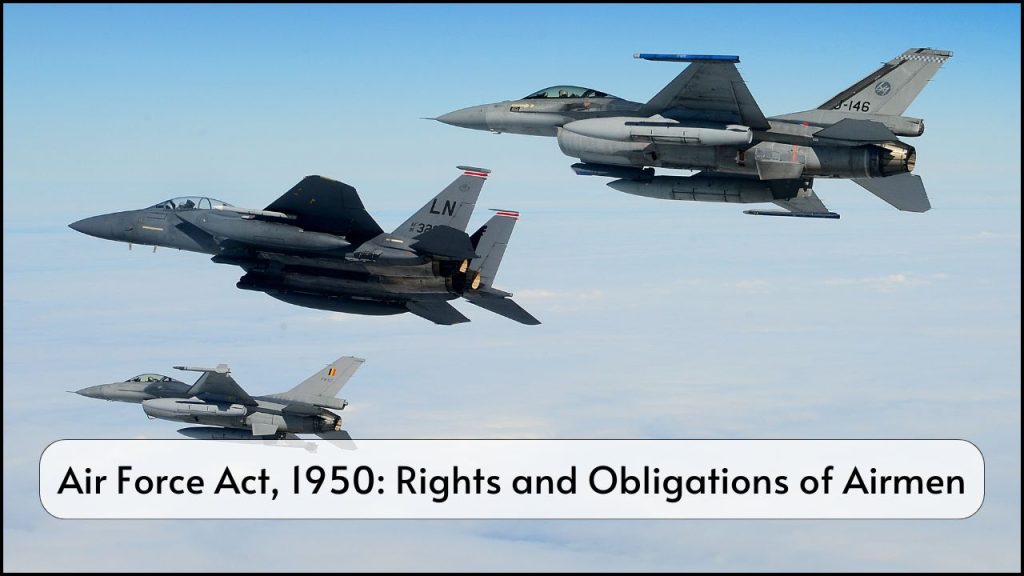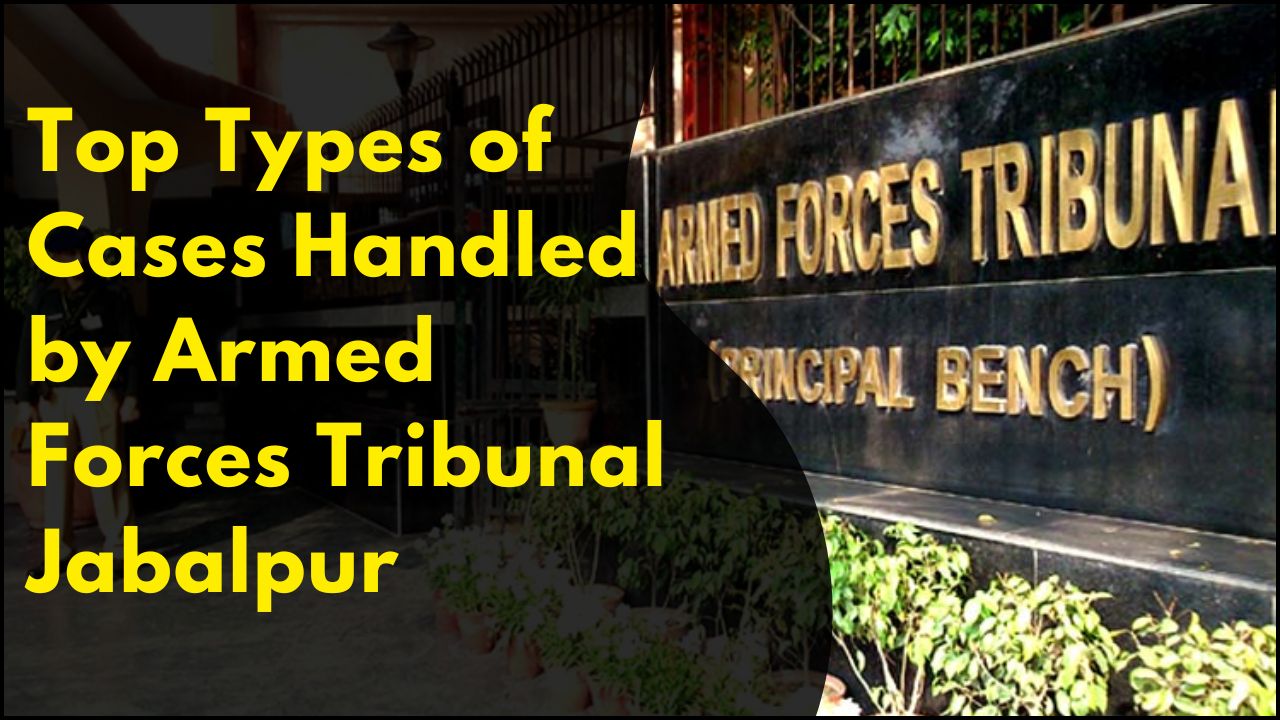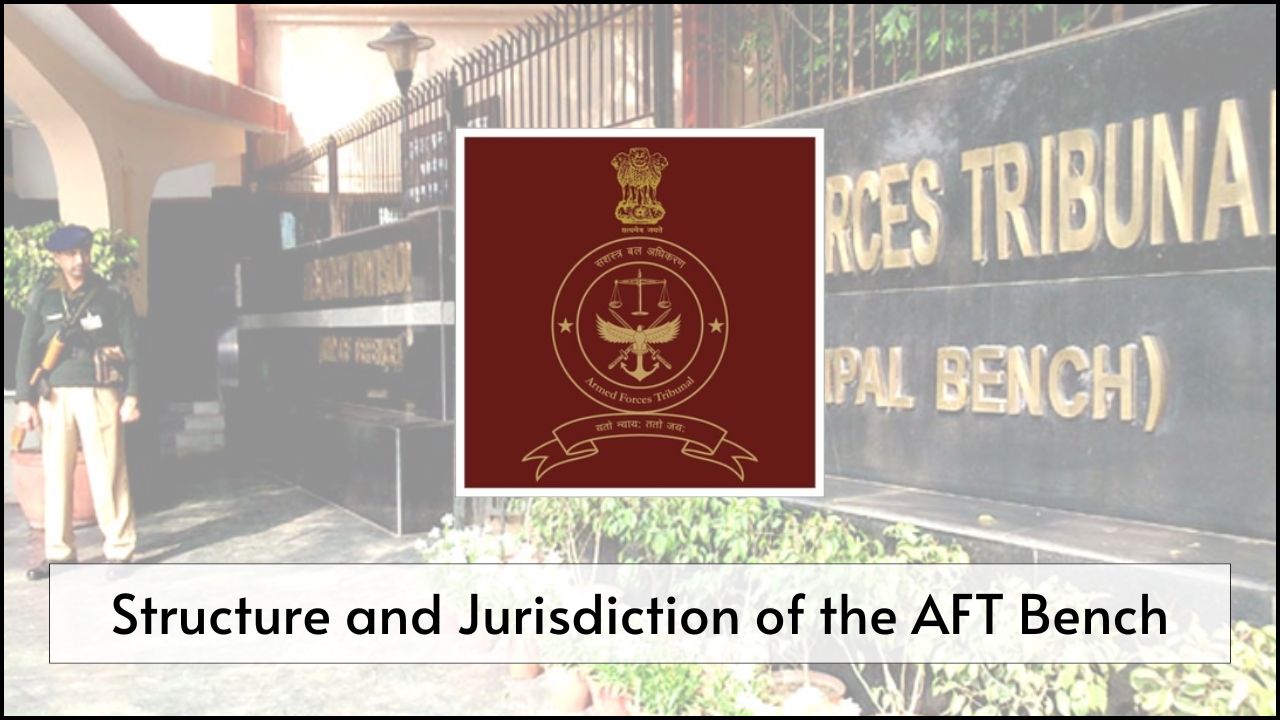
The Air Force Act, 1950, is a key legal document that governs the conduct, duties, rights, and responsibilities of airmen in the Indian Air Force. This act ensures discipline and provides a legal framework for maintaining order. Every airman must follow the rules mentioned in this act, which also protects their rights as members of the armed forces. The act helps balance duty and justice for those serving the nation.
Table of Contents
Rights of Airmen under the Air Force Act, 1950
Right to Equality
- Equal treatment is given to all airmen, regardless of caste, religion, or region.
- Promotions and assignments are based on merit and performance.
Right to Justice
- A fair trial is guaranteed in case of any offence or disciplinary action.
- Legal representation is allowed during court-martial proceedings.
Right to Appeal
- The right to appeal is available against decisions of the court-martial.
- Higher military authorities can review and modify punishments.
Right to Pay and Allowances
- Timely and fair salary is ensured under the pay rules.
- Special allowances are given based on role, location, and risk.
Right to Leave
- Airmen are entitled to various kinds of leave, such as annual, casual, and medical.
- Emergency leave can be granted in special circumstances.
Right to Family Benefits
- Family welfare schemes are available for dependents.
- Education, healthcare, and housing facilities are provided.
Right to Retire or Resign
- Rules are provided for voluntary retirement or resignation after a certain service period.
- Pension and other benefits are applicable after retirement.
Right to Safety and Medical Care
- Access to military hospitals and regular health check-ups is available.
- Safety measures are ensured in daily operations.
Obligations of Airmen under the Air Force Act, 1950
Obedience to Orders
- Airmen must follow the lawful commands of superior officers.
- Disobedience is treated as a serious offence.
Discipline and Conduct
- Discipline is mandatory both on and off duty.
- Unbecoming conduct or misbehavior can attract punishment.
Service Commitment
- Airmen are required to serve for a minimum period as per their contract.
- Desertion or refusal to serve is punishable.
Confidentiality
- Protection of service-related information is a duty.
- Sharing classified data is strictly forbidden.
Availability for Duty
- Readiness for service at any time and location is required.
- Refusal to report for duty is not allowed.
Proper Use of Property
- Careful use of military equipment and facilities is expected.
- Damage or misuse leads to penalties.
Respect for Authority
- Proper behavior towards superiors and fellow personnel is mandatory.
- Disrespectful behavior can lead to disciplinary action.
Loyalty to the Nation
- Absolute loyalty to India and its Constitution is a key responsibility.
- Any act of disloyalty is considered a grave offence.
Punishments under the Air Force Act, 1950
Punishment Types and Their Meaning
| Type of Punishment | Explanation |
|---|---|
| Dismissal | Permanent removal from service |
| Forfeiture of Pay | Loss of salary for a certain period due to misconduct |
| Imprisonment | Confinement in a military or civil prison |
| Detention | Holding the airman in a detention barrack for a specified time |
| Reduction in Rank | Monetary penalty for breaking the rules or causing damage |
| Fine | Holding the airman in a detention barracks for a specified time |
| Reprimand | Official warning or censure |
| Extra Duties | Assignment of additional tasks as a form of minor punishment |
Rights during Court Martial
Types of Court Martial
| Type | Details |
|---|---|
| General Court Martial | Deals with serious offences like desertion or treason |
| District Court Martial | Handles less serious but still important cases |
| Summary General Court Martial | Quick trial used in urgent cases, usually during active operations |
| Summary Court Martial | Used for very minor offences, trial without a law officer |
Rights of the Accused Airman
- Legal Aid: Access to legal advice or a lawyer.
- Fair Hearing: Opportunity to present evidence and witnesses.
- Right to Silence: No forced confession or statement is allowed.
- Right to Appeal: Judgment can be challenged through a proper process.
Duties Related to National Security
Security Responsibilities
- Airmen must protect sensitive information.
- Secure handling of aircraft, arms, and ammunition is mandatory.
Disaster Relief
- In natural disasters, airmen are required to assist in rescue and relief.
- Participation in civilian support tasks is part of their role.
Training and Fitness
- Regular physical and technical training is compulsory.
- Skill upgradation is required throughout the service.
War-time Obligations
- Airmen must be prepared for deployment during wars or emergencies.
- Risk to life is accepted as a part of the duty.
Leave and Service Benefits
Types of Leave
| Leave Type | Duration & Purpose |
|---|---|
| Annual Leave | Granted once a year for rest and personal matters |
| Casual Leave | Short leave for urgent personal work |
| Medical Leave | Leave due to illness or injury |
| Maternity/Paternity Leave | Leave for childbirth or child care |
| Emergency Leave | Leave due to family emergencies like death or serious illness |
Service Benefits
| Benefit | Description |
|---|---|
| Pension | Monthly payment after retirement |
| Gratuity | One-time lump sum payment post-service |
| CSD Facilities | Access to subsidized goods and services through military canteens |
| Medical Care | Free treatment in military hospitals |
| Housing | Allotment of government quarters or HRA |
| Education for Children | Assistance for children’s education through scholarships or schools |
In Summary
The Air Force Act, 1950, not only sets a high standard of discipline but also ensures that airmen are treated fairly and given the respect and care they deserve. Rights and obligations go hand in hand under this act. Each airman is expected to perform their duties with honor, while also receiving support and protection from the law. This act plays a crucial role in maintaining the strength and dignity of the Indian Air Force.





